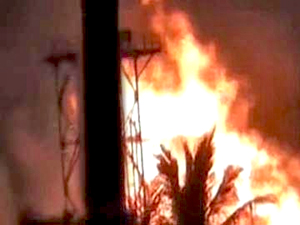
Hyderabad, Jun 27: At least 14 people were killed and seven others injured in a fire following a blast in a gas pipeline belonging to GAIL in Andhra Pradesh's East Godavari district today, a senior state minister said.
"As per initial reports we have received, 14 deaths have been reported and some more are critically injured and undergoing treatment," Andhra Pradesh Finance Minister Yanamala Ramakrishnudu told reporters here.
According to an official of the East Godavari district, the administration has recovered 13 bodies from the accident site while another death was reported from the hospital where the injured are being treated.
East Godavari District Collector Neetu Kumari Prasad told PTI that the incident took place in the early hours.
"As of now the fire has been brought under control. Fire engines were rushed to the spot and rescue operations are underway," Prasad said.
The accident occurred at Nagaram village in Amalapuram Mandal, she said, adding that three persons are critically injured.
All the injured have been rushed to a nearby hospital, the collector said.
Andhra Pradesh Chief Minister N Chandrababu Naidu expressed shock over the loss of lives in the incident.
Naidu, who is now on a visit to Delhi, reviewed the situation with the collector and senior officials.
He asked state Deputy Chief Minister N Chinarajappa and the collector to rush to the spot to monitor the relief operation.
Naidu later tweeted, "(I've) ordered an inquiry and action plan to avoid these in future."
"My condolences to the families who lost their loved ones in East Godavari blast," he said in another tweet.
"Asked Deputy Chief Minister Chinarajappa to go the pipeline blast site and provide required support. We need a preventive plan to ensure safety," he added.





Comments
Add new comment